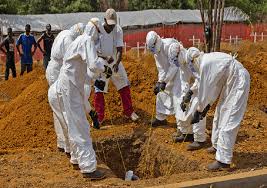
Kigali: Fadela Chaib, for the World Health Organization (WHO), said that the Ministry of Health, WHO and partners had continued to face challenges in the containment and control of the Ebola virus disease outbreak in the Democratic Republic of the Congo (DRC).
The number of reported cases had increased in recent weeks, most notably in the Katwa health zone, where response teams had faced pockets of community mistrust.
The outbreak had also extended southwards to the Kayina health zone, a high security risk area. Teams were working actively to build community trust and scale up response activities around those new clusters.
As of 22 January 2019, there had been a total of 713 Ebola cases, of which 664 were confirmed and 49 were probable, including 439 deaths. The overall case fatality ratio was 62 per cent.
Thus far, 247 people had been discharged from Ebola treatment centres, with many having enrolled in a dedicated programme for survivors. The decline in cases in Beni, a former epicentre, was a strong positive indication of how effective the response could be despite the multiple challenges.
However, vigilance was still necessary. WHO currently had some 450 staff in the country to support the Ebola response. Over 60,000 people had been vaccinated in DRC. More than 2,600 people had been vaccinated in Uganda as a preventative measure, though there were no confirmed cases of Ebola there.
Approximately 37,000 contacts had been registered and over 4,000 were under surveillance. There were currently 156 patients hospitalized in seven treatment centres, of whom 23 were confirmed cases. (End)
